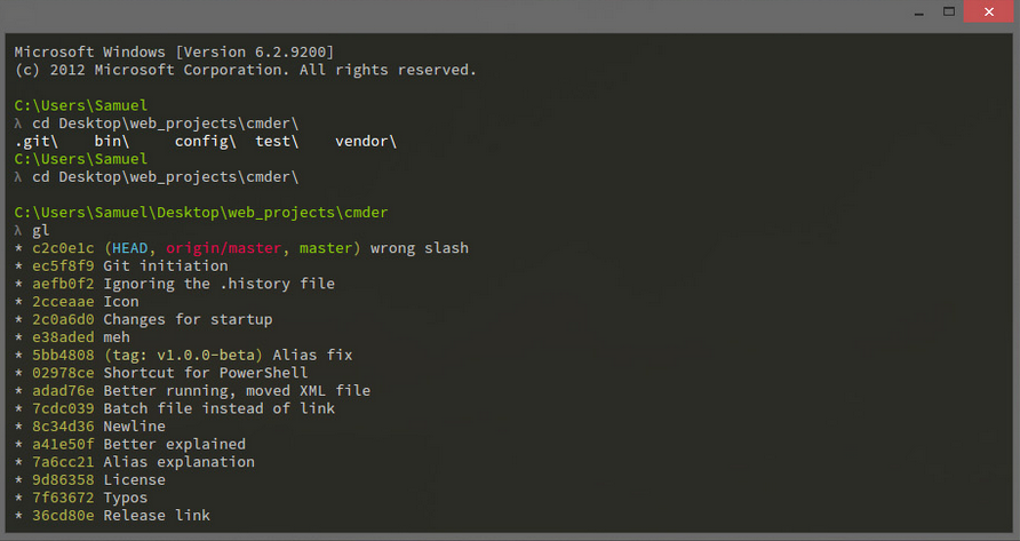cmder is a free and open-source console emulator for Windows that has gained significant popularity among developers and system administrators. It provides a robust and customizable alternative to the default Windows command prompt, offering a more user-friendly and feature-rich experience. Unlike many other emulators, cmder distinguishes itself through its portability, extensive customization options, and seamless integration with various command-line tools. This article delves into the features, advantages, and drawbacks of cmder, exploring why it’s become a preferred choice for many users.
A Portable and Feature-Rich Console Emulator
cmder stands out from the crowd due to its compact size and portability. Available in both mini (around 6MB) and full (around 40MB) versions, it can be easily stored on a USB drive, making it readily accessible across multiple machines. This portability is invaluable for users who frequently work on different computers or need to quickly set up a consistent command-line environment. The core application is incredibly lightweight, ensuring minimal impact on system resources. This contrasts sharply with some larger and more resource-intensive applications. Further enhancing its accessibility, cmder boasts support for multiple languages, ensuring a broader user base can take advantage of its features.
Rather than being a single application, cmder acts more like a software package. This comprehensive suite incorporates several key components, providing a multifaceted command-line experience. It seamlessly integrates with various tools and functionalities, such as Git Bash, providing a convenient centralized hub for managing diverse command-line tasks.
Enhanced Functionality and Usability

cmder significantly improves upon the limitations of the standard Windows command prompt and other basic emulators. One major improvement lies in its support for standard copy and paste functions using Ctrl+C and Ctrl+V. This seemingly minor enhancement drastically increases efficiency, eliminating the need for cumbersome workarounds. Beyond this, cmder includes a wide array of built-in aliases, simplifying common tasks. For instance, the “.e” alias instantly launches an Explorer window at the current directory, streamlining file navigation.
Beyond basic functionality, cmder offers powerful features that appeal to experienced command-line users. It supports common UNIX commands such as mv, ls, cp, cat, and grep, extending the functionality well beyond what’s available in the standard Windows environment. This familiar command set streamlines workflows for those transitioning from Linux or other UNIX-like systems. The incorporation of tabs allows for managing multiple command-line sessions simultaneously, a feature that enhances productivity and organization, particularly when juggling numerous tasks.
Comparison with Alternative Emulators
While cmder is a strong contender, other console emulators exist. ConEmu, for instance, is a popular alternative that offers similar functionality. However, cmder’s blend of portability, ease of use, and extensive feature set often make it the preferred choice. Other emulators might offer specialized features, but cmder generally provides a better balance of usability and comprehensive functionality. The streamlined interface and integrated features allow users to quickly accomplish tasks without being overwhelmed by complex configurations. It sits comfortably between simple command prompts and more comprehensive IDE environments.
The simplicity and efficiency offered by cmder allows users to transition quickly between tasks, maximizing workflow. The small footprint of the software and the extensive alias system drastically improve productivity, especially when compared to other, more resource-intensive emulators or IDEs. It acts as a bridge, offering the advanced functionality of powerful tools with the streamlined accessibility of simpler applications.
Advantages of Using cmder
Several key advantages contribute to cmder’s widespread adoption:
- Portability: Its small size and ability to run from a USB drive make it exceptionally portable. This is a significant benefit for users working across multiple machines.
- Ease of Use: The intuitive interface and comprehensive help documentation ease the learning curve, making it accessible to both beginners and experienced users.
- Extensive Feature Set: cmder offers a wide array of features, including tabbed sessions, built-in aliases, and support for common UNIX commands, boosting productivity.
- Customization: While offering a functional default configuration, cmder allows extensive customization through its settings, enabling users to tailor the environment to their preferences.
- Integration: cmder integrates seamlessly with Git, providing a streamlined workflow for developers working with version control systems. This integration eliminates the need for separate tools and streamlines development workflows.
- Community Support: A thriving online community provides ample support and resources, ensuring that users can quickly find answers to questions and resolve issues.
Potential Drawbacks of cmder
Despite its many advantages, cmder has a few limitations:
- Initial Learning Curve: While generally user-friendly, the extensive feature set might present a slight learning curve for complete novices to command-line interfaces.
- Limited Documentation: While help is available, some users might find the documentation could be more comprehensive and detailed. This is especially true for advanced features and configuration options.
- Dependence on Git: While the Git integration is a significant plus for many, it can be a drawback for those who don’t use Git.
- Maintenance: While actively maintained, relying on a single-developer maintained project carries a certain degree of risk compared to larger projects with broader development teams.
Conclusion
cmder offers a compelling alternative to standard Windows command prompts and other console emulators. Its portability, feature-rich environment, and ease of use make it a strong choice for both casual and professional users. The integration with popular tools like Git enhances its appeal to developers. While a minor learning curve and limited documentation might pose challenges for some, the advantages outweigh the drawbacks for a large number of users. cmder successfully bridges the gap between simple command-line tools and more complex IDEs, providing a balanced and productive experience. The continuous development and community support ensure cmder remains a relevant and valuable tool in the Windows ecosystem.
File Information
- License: “Free”
- Latest update: “December 4, 2024”
- Platform: “Windows”
- OS: “Windows 8.1”
- Language: “English”
- Downloads: “103.8K”
- Size: “165.67 MB”
















